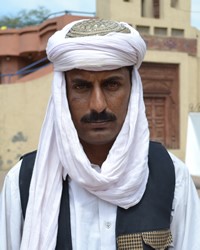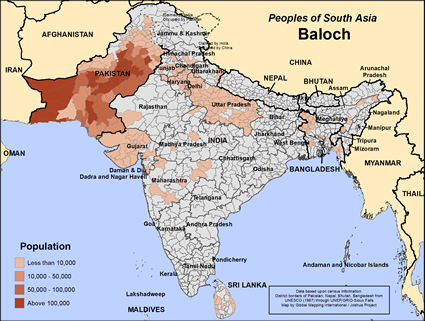Baloch in India

Photo Source:
Khalid Mahmood - Wikimedia
Creative Commons
|

Map Source:
People Group data: Omid. Map geography: UNESCO / GMI. Map Design: Joshua Project.
|
| People Name: | Baloch |
| Country: | India |
| 10/40 Window: | Yes |
| Population: | 58,000 |
| World Population: | 3,312,000 |
| Primary Language: | Hindi |
| Primary Religion: | Islam |
| Christian Adherents: | 0.00 % |
| Evangelicals: | 0.00 % |
| Scripture: | Complete Bible |
| Ministry Resources: | Yes |
| Jesus Film: | Yes |
| Audio Recordings: | Yes |
| People Cluster: | Baloch |
| Affinity Bloc: | South Asian Peoples |
| Progress Level: |
|
Introduction / History
Their name, "Baloch," is shrouded in controversy. Some say it means "nomad," while others claim it is an old Persian word meaning "the cock's crest." Their history is just as mysterious. Some have traced their origins to Nimrod, son of Cush (Noah's grandson). But while some things are uncertain, we know that they first moved to the region in the twelfth century. During the Moghul period, this territory became known as "Balochistan."The various Baloch groups speak different languages, each with distinguishing characteristics. Their original homeland reaches from eastern Balochistan to southwestern Punjab, which borders India. This high, dry region was once a very populated country, watered by many flowing rivers. Today, it is a barren area of rocky mountains and dry river valleys mixed with desert land.
It is difficult to make a living in that region, so there is a large Baloch diaspora. This diaspora includes India, Sri Lanka, the UAE, Qatar, Saudi Arabia, Somalia, and even Turkmenistan in Central Asia. There are many other countries where the Baloch live as well. The Baloch people in India usually live either in Mumbai and the states of western India, or further east in Uttar Pradesh. Some have deep roots in India that date back hundreds of years when they first came as camel drivers.
What Are Their Lives Like?
The Baloch people in India are very unusual. A small number are Hindu. There are well-known entertainers in the Bollywood movie industry who are Baloch. Others have deep roots in India that date back hundreds of years.
Today most live in mixed ethnic communities, though most of their neighbors are also Sunni Muslim. They prefer to marry other Baloch, but it's common in India for them to marry Pathans, another ethnic group that has their roots in Pakistan.
Baloch marriages are arranged between the bride's father and the prospective groom. His family pays a bride price of livestock and cash. Once a woman is married, she passes from the authority of her father to that of her husband. Marriages are monogamous and lifelong, and marrying a non-Baloch is strictly forbidden, though they sometimes make exceptions for the Pathans.
Baluchmayar, or the "Baluchiway," is the honor code by which the Baloch live. These principles include extending hospitality and mercy, dealing with each other honestly, and offering refuge to strangers. Songs and poetry preserve these virtues. Children learn proper behavior by watching their elders and are taunted whenever they misbehave.
What Are Their Beliefs?
The Baloch are Sunni Muslims who in theory are part of several "schools." They identify with Sunni Islam, but for specifics, only the religious intellectuals actually adhere to the schools of Sunni Islam. A typical Baloch is likely to be involved with pre-Islamic practices that involve jinns, the evil eye, etc. They believe it is necessary to appease the spirit world for their practical needs, since Allah is so distant.
What Are Their Needs?
The Baloch need to understand that there is only one way to abundant life and eternal salvation: Jesus Christ.
Prayer Points
Pray for a movement of Jesus to heal and strengthen Baloch communities.
Pray for a "Book of Acts" type of movement to Christ among the Baloch in India.
Pray for the Baloch people to understand and embrace that Jesus wants to bless their families and neighborhoods.
Pray for Holy Spirit anointed believers from the Baloch people to change their society from within.
Pray for a movement in which the Holy Spirit leads and empowers disciples to make more disciples.